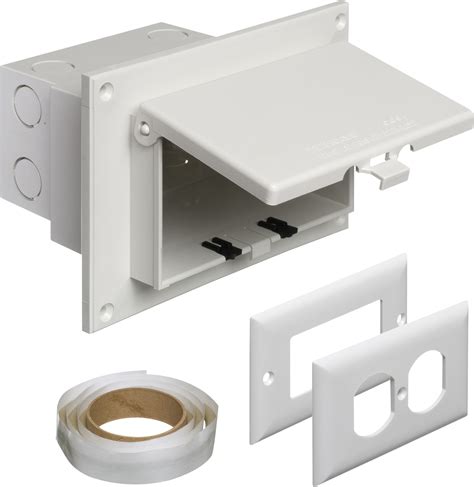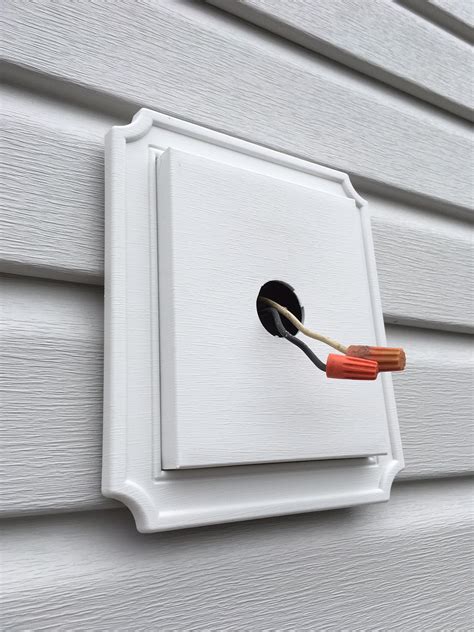electrical outlets not using a box Inadequate protection: Outlets do not provide the same level of protection as junction boxes, leaving wires and connections exposed to electrical shock and fire hazards. . Choose the under cabinet range hood that fits your kitchen and your lifestyle. This .
0 · outside outlet plastic receptacle box
1 · outdoor outlet receptacle box
2 · no electrical box needed
3 · metal receptacle box for outlet
4 · electrical receptacle boxes
5 · electrical installations without boxes
6 · electrical installation no junction box
7 · electrical boxes without junction box
SECURE 3-POINT LOCKING – These Lockable stainless-steel doors feature a unique 3 point locking system that secures the top, middle, and base of the .
Inadequate protection: Outlets do not provide the same level of protection as junction boxes, leaving wires and connections exposed to electrical shock and fire hazards. . Use metal boxes. A standard 4”x4” steel box is 1-1/2” deep and gives 22 cubic inches (room for four /2 cables plus a receptacle or switch). A .
As a counterdatapoint, I have never seen a non-plastic outlet or box, either indoors or outdoors. Metal outlets seem to be a largely US phenomena. There should be no issues . When your electrical outlet isn’t working, first check the circuit breaker and fuse box. A tripped GFCI outlet can stop another outlet from working, but it can be reset to restore function to .
It is recommended but not required that you use a plastic electrical box when you have Romex (or NM) cables leading in or out of the box. The electrical code does not require that you use NM cable with plastic boxes. Wiring connections—where wires join an outlet, switch or other wires—must be inside an electrical box. Here’s why: Connections are the weak link in an electrical system. If they get damaged, loosened or pulled apart, . Use this easy method from our expert to install a new electrical outlet without a lot of wire pulling, plus insight into NEC guidelines. Electrical boxes encase wire connections to protect them from short circuits. They are vital for fire safety and are used for receptacles, ceiling fans, outside outlets, and more. Unless the device is one of the few that .
Electrical devices and their wire connections must be enclosed in an electrical box. Known as a junction box , this metal or plastic enclosure protects the wiring. But some devices do not require a separate junction box .
Inadequate protection: Outlets do not provide the same level of protection as junction boxes, leaving wires and connections exposed to electrical shock and fire hazards. Code compliance: Using an outlet as a junction box may not comply with local electrical codes and regulations. NEC Requirements For Junction Boxes
Use metal boxes. A standard 4”x4” steel box is 1-1/2” deep and gives 22 cubic inches (room for four /2 cables plus a receptacle or switch). A deep 4x4 box is 2-1/8” deep. You can put a 1-gang mud ring or plate on either one. As a counterdatapoint, I have never seen a non-plastic outlet or box, either indoors or outdoors. Metal outlets seem to be a largely US phenomena. There should be no issues associated with using a plastic box for an outdoor receptacle. When your electrical outlet isn’t working, first check the circuit breaker and fuse box. A tripped GFCI outlet can stop another outlet from working, but it can be reset to restore function to . It is recommended but not required that you use a plastic electrical box when you have Romex (or NM) cables leading in or out of the box. The electrical code does not require that you use NM cable with plastic boxes.
Wiring connections—where wires join an outlet, switch or other wires—must be inside an electrical box. Here’s why: Connections are the weak link in an electrical system. If they get damaged, loosened or pulled apart, you’re left without power, or worse, with a fire. Use this easy method from our expert to install a new electrical outlet without a lot of wire pulling, plus insight into NEC guidelines. Electrical boxes encase wire connections to protect them from short circuits. They are vital for fire safety and are used for receptacles, ceiling fans, outside outlets, and more. Unless the device is one of the few that contains its own wires, it likely will need an electrical box. Replacing an electrical outlet may sound intimidating, but it’s really a simple conversion. With a few tools and some safety measures, you can easily replace an electrical outlet with a new one or install a ground-fault circuit interrupter (GFCI) outlet. Product costs, availability and item numbers may vary online or by market.
Electrical devices and their wire connections must be enclosed in an electrical box. Known as a junction box , this metal or plastic enclosure protects the wiring. But some devices do not require a separate junction box . Inadequate protection: Outlets do not provide the same level of protection as junction boxes, leaving wires and connections exposed to electrical shock and fire hazards. Code compliance: Using an outlet as a junction box may not comply with local electrical codes and regulations. NEC Requirements For Junction Boxes Use metal boxes. A standard 4”x4” steel box is 1-1/2” deep and gives 22 cubic inches (room for four /2 cables plus a receptacle or switch). A deep 4x4 box is 2-1/8” deep. You can put a 1-gang mud ring or plate on either one.

As a counterdatapoint, I have never seen a non-plastic outlet or box, either indoors or outdoors. Metal outlets seem to be a largely US phenomena. There should be no issues associated with using a plastic box for an outdoor receptacle. When your electrical outlet isn’t working, first check the circuit breaker and fuse box. A tripped GFCI outlet can stop another outlet from working, but it can be reset to restore function to . It is recommended but not required that you use a plastic electrical box when you have Romex (or NM) cables leading in or out of the box. The electrical code does not require that you use NM cable with plastic boxes.
Wiring connections—where wires join an outlet, switch or other wires—must be inside an electrical box. Here’s why: Connections are the weak link in an electrical system. If they get damaged, loosened or pulled apart, you’re left without power, or worse, with a fire. Use this easy method from our expert to install a new electrical outlet without a lot of wire pulling, plus insight into NEC guidelines.
outside outlet plastic receptacle box
outdoor outlet receptacle box
Electrical boxes encase wire connections to protect them from short circuits. They are vital for fire safety and are used for receptacles, ceiling fans, outside outlets, and more. Unless the device is one of the few that contains its own wires, it likely will need an electrical box.

no electrical box needed
metal receptacle box for outlet
electrical receptacle boxes

Quiet Efficiency: With a maximum noise level of 60 decibels, this range hood combines power and efficiency without disrupting your kitchen serenity. Easy Installation: Designed for convenience, the range hood fits snugly under cabinets, providing hassle-free installation for an instant upgrade.
electrical outlets not using a box|metal receptacle box for outlet